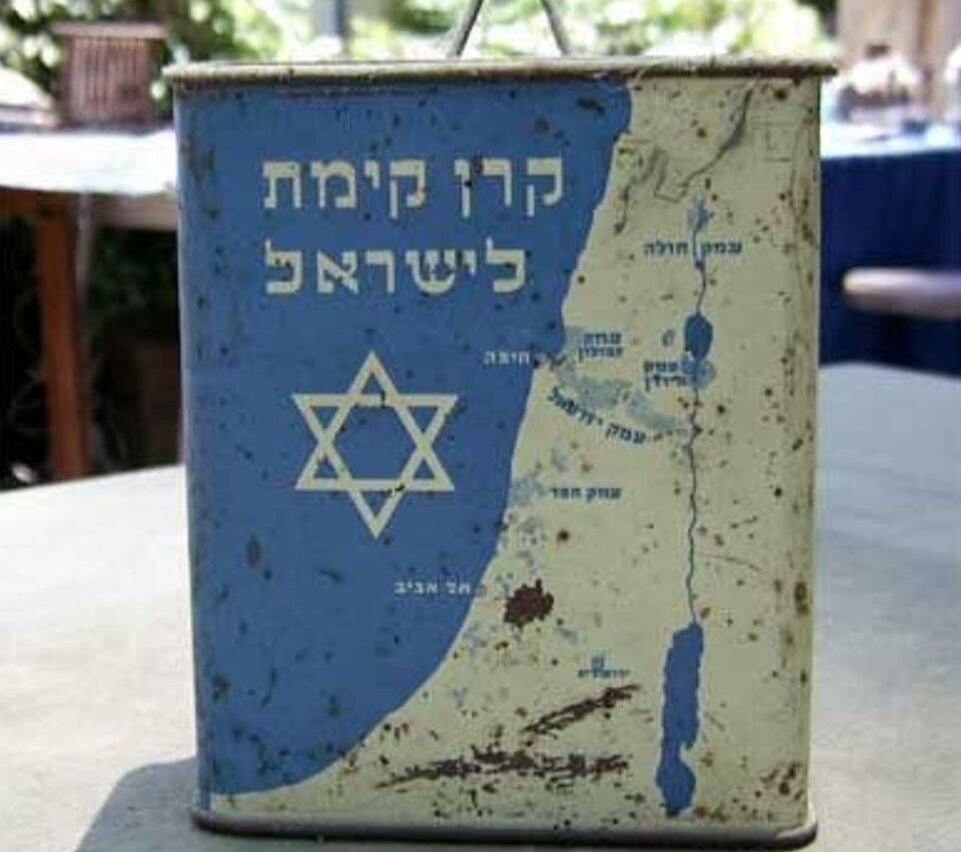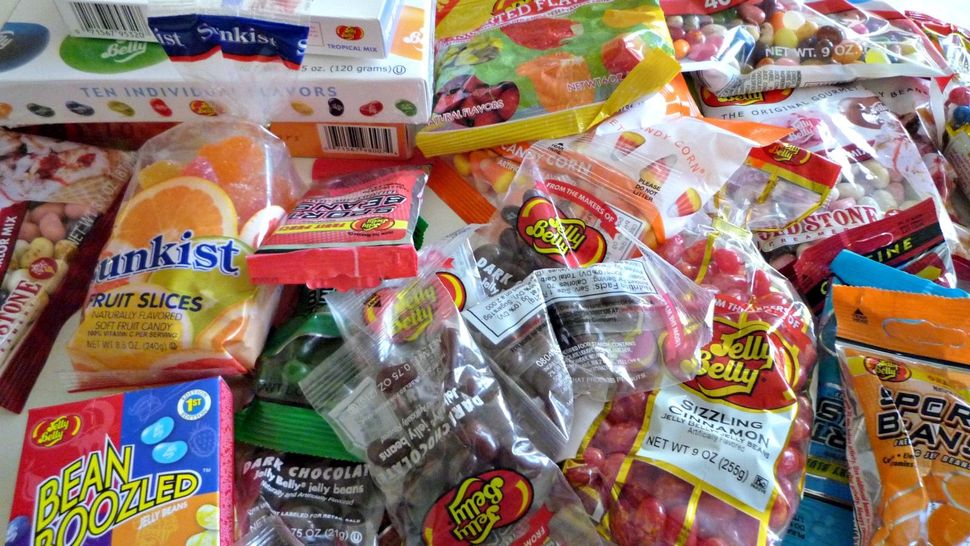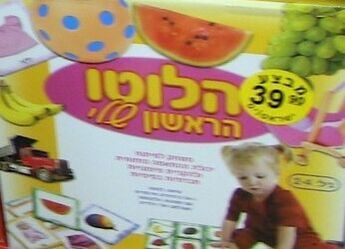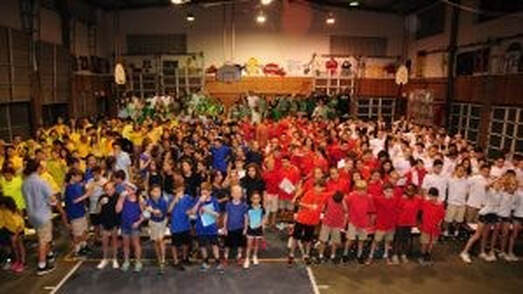|
The Breadcrumbs widget will appear here on the published site.
Let's take a stroll down memory lane to the JNF Tzedakah box, children being allowed to choose what they eat, and other ways of extorting money from your children like My First Lotto, with the Kibbitzer's pictures of laughter from last month. We want to thank David Kilimnick for sharing his anger about giving Tzedakah to Israel, and how he feels about putting roof scraps on a grave of holy rabbi. The stone shortage is a real thing.

The JNF Tzedakah box. One of Israel’s artifacts. The foundation of Israel fundraising. The Jewish National Fund as been doing it for well over fifty years. They were already finding ways to extort money from your child in the first grade then... This is why kids were asking parents for money in the 40s too. (photo: collection of Avraham Goren- in the Forward

What your kid bought at the canteen when the camp gave them a tab. They did give your child the salad bar option. Yet, your child chose this... How your child came back from sports camp fifteen pounds heavier... Why camp cost you an extra 2K. How you went broke, sending your kid away for three weeks… What allowing a nine-year-old to have a tab can do. (photo: Incase/Flickr)
The Blog Tags Widget will appear here on the published site.
Tags:
The Recommended Content Widget will appear here on the published site.
The Breadcrumbs widget will appear here on the published site.
Jewish summer camp is one of the cornerstones of the Jewish experience. Summer camp helped form me into the Jew I am today, and taught me that we Jews don’t play regular sports. We played sports, but they were different. I know this, because I was watching the summer Olympics, and I didn't see anybody competing in bottle cap hockey or paper football.
Here are a few of the special sports that I remember playing as a youth in summer camp, Jewish day school and shul: Newcomb The most serious game we played at Jewish summer camp. It's similar to volleyball, but you can catch the ball. It's like competitive toss. Some people took the game to the next level by throwing the ball over the net and not looking at the exact spot they were tossing it. That's what the real athletes do. Some children wanted to play volleyball, but that caused a big raucous. It was too complicated. And it was too dangerous. Too many children were getting hurt by the ball that was being hit to their side. When they noticed how bad the kids were at catching the volleyball, they made a sport of it. At camp, they made sure that every young Jewish child felt like an athlete. And for that, I thank them for helping me realize how important it was to focus on my studies. Bottle Cap Hockey The number one game played during free hour. I was quite a competitor. Free hour was quiet time, so we had to stay near the bunk and play sports that wouldn’t make noise, until we got excited. Excitement is too loud for rest hour. Excitement is hitting a bottle cap the length of the table all the way to the other guy’s hand. That is a reason to cheer. When it came to hitting a bottle cap between the opponent’s pinky and pointer finger, there were not many as agile as I. I don't mean to show off, but I was good. Paper Football Another sport that I played with a mastery and finesse that could only be displayed by one who did not run track. We would fold a paper towel into a triangle, and then take part in the art of causing that paper towel to land on the end of the table. The greatest reward I've ever experienced. Other than skimming the top layer of the baked mac and cheese. After landing the paper football on the end of the table, we'd flick it through a field goal made out of pointer fingers, and then lose the paper. Without pointer fingers, we would have been at a loss for free hour sports. We played paper football when drought hit the camp, and bottles were hard to come by. I was an avid paper football player the whole year round, as I also played it every Shabbat of my childhood, in shul. I had to do something in shul. My dad was making me go anyways. So, I figured I would use my time in synagogue for something productive. The young Jewish athletes we were, we did play tackle paper football once. That turned into a fight. We forgot about the game and started a brawl. If you cannot find the paper football, tackling a friend in the middle of services is frowned upon. As I learned later on, the only hostile sentiments allowed in shul are those for the rabbi. Color War Cheering is the sport. Cheering and prejudice against other colors is the competition. There's nothing like this in sports, where excitement is the activity. Three days of excitement and hatred of your fellow bunkmate. Running is also a form of excitement. Which is why we double the excitement with races during color war. This makes for the climax of color war, where the eight-year-olds run and have no idea what to do with the baton. The uncoordinated running, as a race, is exciting. You add cheers and hatred of your fellow Jew, and it's the climax of all Jewish summer sports events. Floor Hockey This is the most serious of Jewish games, as we weren't coordinated enough to play hockey on ice. We played as if we were going to be professional floor hockey players. The benefit of playing on the floor is that when the fight breaks out, you are able to push off your feet, allowing for a more powerful punch. We played hockey with a ball. A puck would have changed the makeup of the sport. That was how we figured out what sports we could play. We were allowed to play any sport, but we were not allowed to use the allotted equipment for the sport. We played hockey without a puck. We used a ball or bottle caps. We played football with a paper towel. We played basketball with a spoon wedged into wood. Volleyball and soccer (football in every other country outside of America) were the only games that we played with the correct gear. However, it was newcomb and crab soccer. Soccer was allowed, but only while leaning back, on our palms, on all fours, moving on the ground like a crab. This was to remind us that we had no chance of competing professionally. And to remind us that we look like fools when we exercise. To quote Richard: Judaism has lots of rules. When it comes to sports, we don’t like following them. To this day, floor hockey is the number one sport played in the New York Yeshiva league, keeping hockey on the parquet. Machanayim- Dodgeball The idea behind this game was to try your hardest to hurt other children. The sport is played with the hardest flexible ball known to man, squeezable enough so that when it hits you the rubber is able to stick to your face for an extra second. This allows for the enhanced burning sensation of skin being removed from your skull. Rules: You get hit, you are out. You suffered enough, you don't have to play anymore. If you catch it and risk yourself, you are rewarded for your effort and extreme pain, and the other person is out. Dodgeball was never on the schedule. Nonetheless, the counselors would implement a game whenever we did not clean the bunk well enough. Gaga Again, the objective is to not get hit. Similar to dodgeball, the difference is that you cannot hold the ball in gaga, you have to whack it. Whack it as hard as you can at other children. You whack the ball with your fist, so that it moves faster and hurts more. We weren't an athletic bunch, but the sports staff realized that if our lives were at stake, we would run. Even the kids with asthma. That is what happens when fifteen-year-old boys make up sports. Violence, and kids crying and running away as fast as they can. The most similar game to this is skirmish (paintball) without protective gear. Due to lack of coordination, many children ended up in the infirmary. Capture the Flag Another sport where you try to run away. The idea is to get very nervous and run a lot. That is the idea of most Jewish sports. You run away from stuff that is trying to catch you or hit you, and you work up your heart rate with an anxiety attack. Torah Baseball I have a feeling that the camp rabbis were baiting us into learning Torah. I never hit a homerun, but I did know Rashi’s commentary on the Red Heifer, and that was a grand slam to my rabbi. I am convinced that wasn’t a real sport. But I was good and they did call it baseball. That did work for me. And I did sweat when they called on me to answer the question. Thinking back, they should've just told us we weren't athletes and showed us movies. What Jewish Sports Mean I loved these sports. It is a shame they don't have a Torah-Bee, more nontechnical sports focused on injuring people, or sports that you can play while eating lunch at a picnic table, in the Olympics. If gaga was a professional sport, I would be an athlete. If soccer was a sport played with people on all fours, looking like crabs, I would be a person the children looked up to. If I was allowed to catch the volleyball, I could have represented Israel in international competition. But I will tell you this. I still play paper football, and there is no greater feeling of achievement in sports then when you see a folded paper towel land on the end of a table. That is the sense of accomplishment felt in Jewish competition. And that is what brings so many of our children Jewish pride at summer camp. The Blog Tags Widget will appear here on the published site.
Tags:
The Recommended Content Widget will appear here on the published site.
|
A well put together cover page for a Jewish newspaper. I knew I was reading a Frum Jewish newspaper, as they found a way to fit 28 ads on the cover page. And the feature article is an ad for Amor jewelry... A properly written Jewish magazine should be advertisements. I once read a non-religious magazine, and I felt like a sinner when I read an article to only find there was no phone number at the end of it. I felt defiled… It’s a shame the Amor ad is so big. They could’ve got another 20 ads in.
(Shulchan Aurch 568:1) One who eats by accident on a fast must continue fasting. Making for a three hour fast to fully mourn the Churban of the Temples. I believe that break between meals fully calls to heart the true yearning of my soul over the loss of the Batei Mikdash... You can't eat once you remember you sinned, as one who committed a sin can't commit a second by snacking once they're already full.
Categories
All
Archives
July 2024
|
© 2021 Kibbitzer Magazine and JHF. All rights reserved.
The Kibbitzer, where we take Jewish comedy seriously!!! If you are offended, it's satire.
A friend of the Off The Wall Comedy Theater, JHF and The Kibbitzer are here to bring unity and Jewish connection for you, in honor of Rabbi Kilimnick ZT"L.
The Kibbitzer is Funded by the JHF (The Jewish Humor Foundation) and you.
Contact us to make a donation and to sponsor Harbatzas Tzchok, the spreading of tradition through laughter, with articles or series in honor and memory of your loved ones.
The Kibbitzer, where we take Jewish comedy seriously!!! If you are offended, it's satire.
A friend of the Off The Wall Comedy Theater, JHF and The Kibbitzer are here to bring unity and Jewish connection for you, in honor of Rabbi Kilimnick ZT"L.
The Kibbitzer is Funded by the JHF (The Jewish Humor Foundation) and you.
Contact us to make a donation and to sponsor Harbatzas Tzchok, the spreading of tradition through laughter, with articles or series in honor and memory of your loved ones.








 RSS Feed
RSS Feed

9/1/2023
0 Comments